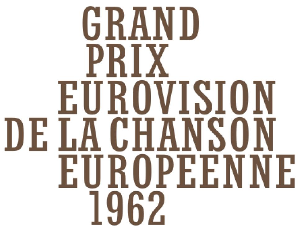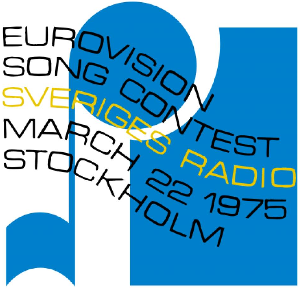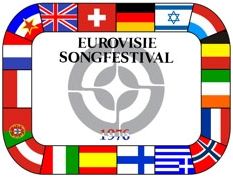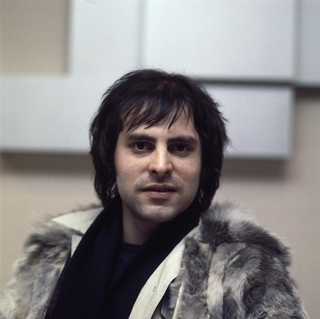
The Eurovision Song Contest 1962 was the 7th edition of the annual Eurovision Song Contest. It took place in Luxembourg City, Luxembourg, following the country's victory at the 1961 contest with the song "Nous les amoureux" by Jean-Claude Pascal. The contest was organised by the European Broadcasting Union (EBU) and host broadcaster Compagnie Luxembourgeoise de Télédiffusion (CLT), and was held at the Villa Louvigny on Sunday 18 March 1962 hosted by the Luxembourgish speaker Mireille Delannoy. This remains the last time that the final of the contest was not held on a Saturday, as since 1963 the final of the contest has consistently been held on a Saturday evening.

The Eurovision Song Contest 1984 was the 29th edition of the Eurovision Song Contest, held on 5 May 1984 in the Théâtre Municipal in Luxembourg City, Luxembourg. Organised by the European Broadcasting Union (EBU) and host broadcaster Radio Télévision Luxembourg (RTL), the contest was held in Luxembourg following the country's victory at the 1983 contest with the song "Si la vie est cadeau" by Corinne Hermès. The event was presented by Désirée Nosbusch, who, at 19 years old, remains the youngest person to have hosted the contest as of 2024.

The Eurovision Song Contest 1975 was the 20th edition of the Eurovision Song Contest, held on 22 March 1975 in the Sankt Eriks-Mässan in Stockholm, Sweden. Organised by the European Broadcasting Union (EBU) and host broadcaster Sveriges Radio (SR), and presented by Karin Falck, the contest was held in Sweden following the country's victory at the 1974 contest with the song "Waterloo" by ABBA.

The Eurovision Song Contest 1976 was the 21st edition of the annual Eurovision Song Contest. It took place in The Hague, Netherlands, following the country's victory at the 1975 contest with the song "Ding-a-dong" by Teach-In. Organised by the European Broadcasting Union (EBU) and host broadcaster Nederlandse Omroep Stichting (NOS), the contest was held at the Nederlands Congrescentrum on 3 April 1976 and was hosted by 1957 Dutch Eurovision winner Corry Brokken.

Luxembourg has participated in the Eurovision Song Contest 38 times since its debut at the first contest in 1956. The Luxembourgish national broadcaster, RTL Luxembourg, participates in the contest representing the country. The nation participated in all but one event between 1956 and 1993, only missing the 1959 contest. After finishing among the bottom seven countries in 1993, Luxembourg was relegated and prevented from competing in 1994. The nation declined to return to the contest in 1995, and would make no further appearances over the next three decades. The country returned to the event for the first time in 31 years in 2024.
Belgium participated in the Eurovision Song Contest 1999 with the song "Like the Wind" written by Ilia Beyers, John Terra, Emma Philippa-Hjälmås and Wim Claes. The song was performed by Vanessa Chinitor. The Belgian entry for the 1999 contest in Jerusalem, Israel was selected through the national final Eurosong '99, organised by the Flemish broadcaster Vlaamse Radio- en Televisieomroeporganisatie (VRT). The competition featured twenty-five competing entries and consisted of three shows. In the final on 28 February 1999, "Like the Wind" performed by Vanessa Chinitor was selected as the winner via the votes of three televoting groups and two jury groups.

Pierre Rapsat was a Belgian singer-songwriter who had a very successful career in his homeland and also spells of popularity in other Francophone countries. Outside these areas, he is best known for his participation in the 1976 Eurovision Song Contest.
The Netherlands participated in the Eurovision Song Contest 2003 with the song "One More Night" written by Tjeerd van Zanen and Alan Michael. The song was performed by Esther Hart. The Dutch broadcaster Nederlandse Omroep Stichting (NOS) returned to the Eurovision Song Contest after a one-year absence following their withdrawal in 2002 as one of the bottom six countries in the 2001 contest. NOS organised the national final Nationaal Songfestival 2003 in collaboration with broadcaster Televisie Radio Omroep Stichting (TROS) in order to select the Dutch entry for the 2003 contest in Riga, Latvia. 32 entries competed in the national final which consisted of five shows: four semi-finals and a final. Eight entries qualified from to compete in the final on 1 March 2003 where "One More Night" performed by Esther Hart was selected as the winner following the combination of votes from a seven-member jury panel and a public vote.
Belgium was represented by Jean Vallée, with the song "L'amour ça fait chanter la vie", at the 1978 Eurovision Song Contest, which took place on 22 April in Paris.
Belgium was represented by Tonia, with the song "Un peu de poivre, un peu de sel", at the 1966 Eurovision Song Contest, which took place on 5 March in Luxembourg City. Tonia was chosen internally to be the Belgian representative, and the song was chosen in the national final on 25 January.
Belgium was represented by Serge and Christine Ghisoland, with the song "À la folie ou pas du tout", at the 1972 Eurovision Song Contest, which took place in Edinburgh on 25 March. "À la folie ou pas du tout" was the winner of the Belgian national final for the contest, held at the RTB studios in Brussels on 15 February. The Ghisolands had previously participated in the Belgian final in 1970.
Belgium was represented by Jean Vallée, with the song "Viens l'oublier", at the 1970 Eurovision Song Contest, which took place in Amsterdam on 21 March. "Viens l'oublier" was chosen at the Belgian national final on 3 February.
Belgium was represented by Claude Lombard, with the song "Quand tu reviendras", at the 1968 Eurovision Song Contest, which took place on 6 April in London. The song was chosen at the Belgian preselection, held on 13 February. Former Belgian representative Tonia (1966) and future participant Nicole Josy also took part.
Belgium was represented by Fud Leclerc, with the song '"Ton nom", at the 1962 Eurovision Song Contest, which took place on 18 March in Luxembourg City. The song was chosen in the Belgian national final on 19 February. This was Leclerc's fourth time at Eurovision, and he still shares the record for the most Eurovision appearances as a main performer. "Ton nom" has also gone down in history as the first Eurovision performance ever to score the infamous nul-points.
Germany was represented by Katja Ebstein, with the song "Theater", at the 1980 Eurovision Song Contest, which took place on 19 April in The Hague. "Theater" was the winner of the German national final, held on 20 March. This was Ebstein's third Eurovision appearance; she had previously represented Germany in 1970 and 1971, finishing third on both occasions.
Denmark was represented by Hot Eyes, with the song "Det' lige det", at the 1984 Eurovision Song Contest, which took place on 5 May in Luxembourg City. "Det' lige det" was chosen as the Danish entry at the Dansk Melodi Grand Prix on 18 February. This was the first of three Eurovision appearances in five years for the couple.
Luxembourg was represented by well-known German singer Jürgen Marcus, with the song "Chansons pour ceux qui s'aiment", at the 1976 Eurovision Song Contest, which took place on 3 April in The Hague. For the second time ever, broadcaster RTL organised a public national final rather than their usual method of internal selection. Marcus was the first German singer to represent Luxembourg, as their 1974 representative Ireen Sheer, although German-based, was British by birth.
France was represented by Catherine Ferry, with the song "Un, deux, trois", at the 1976 Eurovision Song Contest, which took place on 3 April in The Hague.
Ireland was represented by Red Hurley, with the song "When", at the 1976 Eurovision Song Contest, which took place on 3 April in The Hague. "When" was chosen as the Irish entry at the national final on 8 February.
Luxembourg participated in the Eurovision Song Contest 1989 with the song "Monsieur" written by Maggie Parke, Gast Waltzing, Yves Lacomblez and Bernard Loncheval. The song was performed by the band Park Café, which was internally selected by the Luxembourgish broadcaster Radio Télévision Luxembourg (RTL) in February 1989 to represent Luxembourg in Lausanne, Switzerland. RTL organised a three-song national final in order to select Park Café's song and "Monsieur" emerged as the winning song following a public televote held via television and radio on 5 and 6 March 1989.





